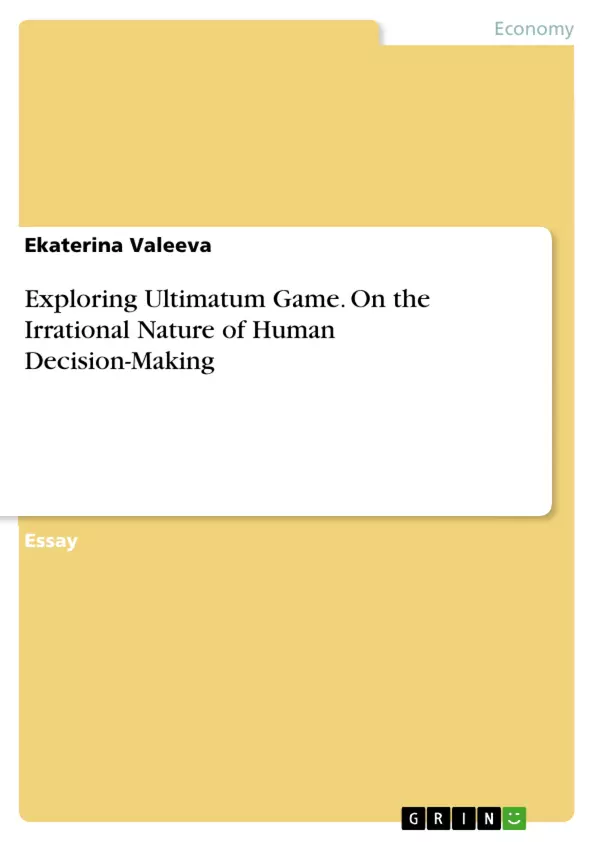This work is concerned with human irrationality, more specifically with the situation of ultimatum game within game theory.
Experimental economics reports evidence of human irrationality, debates on which are of high relevance nowadays. Results of many experiments, particularly games, differ from those expected by neoclassical theory. Human behavior often goes beyond rational choice, prioritizing feelings and beliefs.
Researchers define many factors that influence outcomes of such choice. Present paper by dint of literature review focuses on the ultimatum game in order to understand what factors influence players while making decisions and how they affect outcomes.
Moreover, the paper aims to gather different findings together in order to have a full picture of factors discovered to date. Thus, feeling of justice and fairness, cultural background, time, gender, attractiveness and even mood affect the outcomes of ultimatum game are addressed.
Inhaltsverzeichnis (Table of Contents)
- 1. Introduction
- 2. Literature review
- 2.1 Origin and rules of Ultimatum Game
- 2.2 Fairness
- 2.3 Cultural difference
- 2.4 Time effect
- 2.5 Gender and attractiveness
- 2.6 Mood
- 3. Discussion
- 4. Conclusion
Zielsetzung und Themenschwerpunkte (Objectives and Key Themes)
The objective of this paper is to provide a comprehensive literature review of the Ultimatum Game, exploring the various factors that influence decision-making and outcomes. It aims to synthesize existing research findings to create a holistic understanding of this influential game.
- The influence of fairness and justice on Ultimatum Game outcomes.
- The impact of cultural background on player behavior in the Ultimatum Game.
- The role of irrational factors in decision-making within the Ultimatum Game framework.
- A comparison of Ultimatum Game results with predictions from neoclassical economic theory.
- The exploration of various social motives and beliefs influencing player choices.
Zusammenfassung der Kapitel (Chapter Summaries)
1. Introduction: This introductory chapter establishes the context of the Ultimatum Game within experimental economics. It highlights the discrepancy between the game's theoretical predictions based on rational self-interest and the observed behavior of human (and even chimpanzee) players. The chapter emphasizes the deviation from neoclassical economic models and introduces the paper's aim: to synthesize existing research on the factors influencing decision-making in the Ultimatum Game via a literature review.
2. Literature review: This section delves into various studies exploring factors influencing Ultimatum Game outcomes. It begins by defining the game's rules and its historical context, contrasting the predicted rational behavior with actual player choices. Subsequent subsections systematically explore the impacts of fairness, cultural differences, time constraints, gender and attractiveness, and mood on decision-making and resulting outcomes. The chapter extensively cites previous research, demonstrating diverse perspectives and interpretations concerning why actual player behavior departs from the purely rational model predicted by economic theory. This section lays the groundwork for the subsequent discussion and conclusion.
Schlüsselwörter (Keywords)
experimental economics, ultimatum game, irrational factors, fairness, cultural differences, game theory, homo reciprocator, social preferences, decision-making.
Frequently Asked Questions: Comprehensive Language Preview of the Ultimatum Game
What is the purpose of this document?
This document provides a comprehensive overview of existing research on the Ultimatum Game. It acts as a literature review, exploring various factors influencing decision-making and outcomes in this influential game from experimental economics. It synthesizes research findings to offer a holistic understanding.
What topics are covered in the literature review?
The literature review systematically examines the impact of several key factors on Ultimatum Game outcomes. These include the influence of fairness and justice, cultural background, time constraints, gender and attractiveness of players, and the role of mood. The review contrasts observed behavior with predictions from neoclassical economic theory.
What are the key themes explored in this paper?
Key themes include the influence of fairness and justice on outcomes, the impact of cultural background on player behavior, the role of irrational factors in decision-making, a comparison of results with neoclassical economic predictions, and the exploration of social motives and beliefs influencing player choices.
How is the Ultimatum Game defined, and what is its significance?
The document defines the Ultimatum Game's rules and historical context. Its significance stems from the discrepancy between theoretical predictions based on rational self-interest and the observed behavior of human (and even chimpanzee) players, highlighting deviations from neoclassical economic models.
What are the chapter summaries?
The introduction establishes the context of the Ultimatum Game in experimental economics, highlighting the discrepancy between theoretical predictions and observed behavior. The literature review delves into various studies exploring factors influencing outcomes, systematically examining the impacts of fairness, cultural differences, time constraints, gender and attractiveness, and mood. The document does not explicitly summarize a discussion or conclusion chapter.
What are the keywords associated with this research?
Keywords include experimental economics, ultimatum game, irrational factors, fairness, cultural differences, game theory, homo reciprocator, social preferences, and decision-making.
What is the overall objective of the paper?
The objective is to provide a thorough literature review of the Ultimatum Game, exploring the various factors influencing decision-making and outcomes, and synthesizing existing research to create a complete understanding.
How does this research relate to neoclassical economic theory?
The research explicitly compares the results of the Ultimatum Game with predictions from neoclassical economic theory, highlighting the discrepancies between rational self-interest and observed player behavior. It explores the reasons for this deviation.
What is the intended audience for this document?
The document is intended for academic use, enabling analysis of themes in a structured and professional manner.
- Quote paper
- Ekaterina Valeeva (Author), 2016, Exploring Ultimatum Game. On the Irrational Nature of Human Decision-Making, Munich, GRIN Verlag, https://www.grin.com/document/463247



